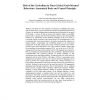Free Online Productivity Tools
i2Speak
i2Symbol
i2OCR
iTex2Img
iWeb2Print
iWeb2Shot
i2Type
iPdf2Split
iPdf2Merge
i2Bopomofo
i2Arabic
i2Style
i2Image
i2PDF
iLatex2Rtf
Sci2ools
141
click to vote
NEUROSCIENCE
2001
Springer
2001
Springer
Role of the Cerebellum in Time-Critical Goal-Oriented Behaviour: Anatomical Basis and Control Principle
The Brain is a slow computer yet humans can skillfully play games such as tennis where very fast reactions are required. Of particular interest is the evidence for strategic thinking despite planning time being denied by the speed of the game. A review of data on motor and cognitive effects of cerebellar lesions leads to propose that the brain minimizes reaction time during skilled behaviour by eliminating on-line planning. Planning of the next action is concurrent with the execution of the current action. The cerebellum plays a role in preparing fast visuo-motor pathways to produce goal-specific responses to sensory stimuli.. Anatomically, the cerebellum projects to all extra-striate components of the fast sensory-motor route: Posterior parietal cortex (PPC), Premotor cortex (PM) and Motor Cortex (M1). Indirect evidences suggest that the cerebellum sets up stimulus-response (S-R) sets at the level of the PPC. Among unresolved issues is the question of how S-R mappings are activated in...
| Added | 30 Jul 2010 |
| Updated | 30 Jul 2010 |
| Type | Conference |
| Year | 2001 |
| Where | NEUROSCIENCE |
| Authors | Guido Bugmann |
Comments (0)

